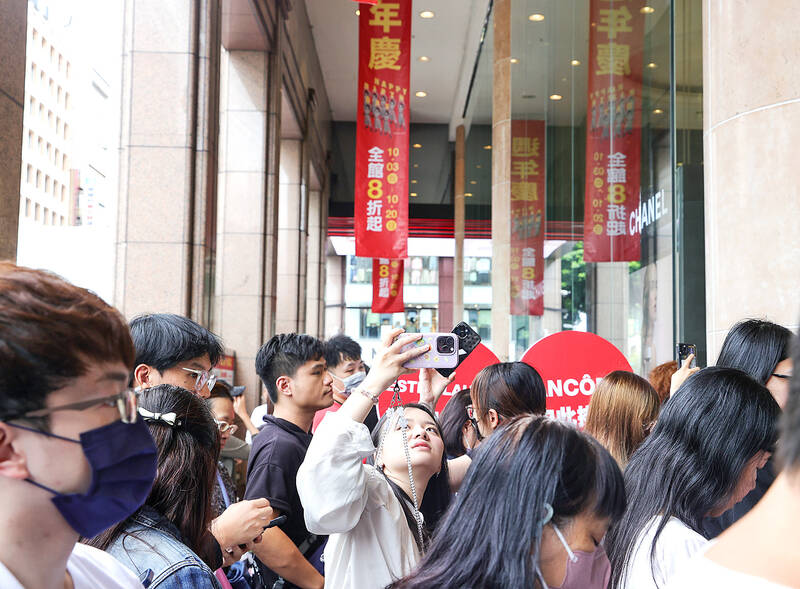The Ministry of Education (MOE) would consider civic groups’ growing concerns about cellphone usage in schools, and promote any legislation passed by the Legislative Yuan, Deputy Minister of Education Chang Liao Wan-chien (張廖萬堅) said yesterday.
The Legislative Yuan’s Education and Culture Committee yesterday held a hearing on the issue of mobile phone addiction among students.
At the meeting, teachers groups advocated for the Ministry of Education to establish unified regulations for all schools, while student groups pushed for clear cellphone usage guidelines that do not result in confiscating devices.

Photo: CNA
Although schools have implemented some rules around students’ use of phones in school, many students do not fully comply, or keep a hidden second phone, Kaohsiung Teachers’ Union deputy director Lee Ya-wen (李雅文) said.
She recommended that the ministry provide explicit guidelines and draft policies to either ban the use of phones for students at the high-school level and below or implement schoolwide management systems.
Asia University vice president and professor of psychology Ko Hui-chen (柯慧貞) said that excessive screen time can lead to shorter attention spans, which in the long term can impact cognitive functions and potentially lead to issues with emotions, behavior and sleep.
EdYouth cofounder Lee Ruei-lin (李瑞霖), a political science student at National Taiwan University, said that students do not oppose consistent guidelines and uniformity across schools, but unilateral restrictions on phone use would cause resentment among students who are digitally savvy and accustomed to the fast pace of modern society.
Democratic Progressive Party (DPP) Legislator Fan Yun (范雲) cited a UNESCO report from July last year, which said that while phones can aid learning, they frequently are a source of distraction.
Fan cited how several European countries, such as Sweden, Germany, France and Belgium, are moving to restrict phone usage in schools, especially for younger students, .
Chinese Nationalist Party (KMT) Legislator Hung Mong-kai (洪孟楷) said that phone addiction is a societal issue that requires cooperation between the Ministry of Education, the Ministry of Culture, the Ministry of Digital Affairs and the Ministry of Health and Welfare.
Chang said that based on the public’s feedback showing a preference for regulations, the Ministry of Education would conduct a policy review and support new legislation if passed.
The Action Alliance on Basic Education also called for government regulations to help teachers and parents reduce students’ screen time, and prevent damage to children’s development.
Alliance chairman Wang Han-yang (王瀚陽) in a statement said that young Taiwanese are facing a severe mental health crisis, citing international research that shows technology addiction and excessive screen time can negatively impact anxiety, depression, attention spans and sleep patterns.
Wang recommended that the relevant ministries work together to develop guidelines based on international experts’ recommendations: Preschool-aged children should avoid cellphones altogether, elementary-school students should be limited to one hour of phone usage a day and middle-school students limited to two hours of usage a day, with no screen time before bed.

The brilliant blue waters, thick foliage and bucolic atmosphere on this seemingly idyllic archipelago deep in the Pacific Ocean belie the key role it now plays in a titanic geopolitical struggle. Palau is again on the front line as China, and the US and its allies prepare their forces in an intensifying contest for control over the Asia-Pacific region. The democratic nation of just 17,000 people hosts US-controlled airstrips and soon-to-be-completed radar installations that the US military describes as “critical” to monitoring vast swathes of water and airspace. It is also a key piece of the second island chain, a string of

A magnitude 5.9 earthquake that struck about 33km off the coast of Hualien City was the "main shock" in a series of quakes in the area, with aftershocks expected over the next three days, the Central Weather Administration (CWA) said yesterday. Prior to the magnitude 5.9 quake shaking most of Taiwan at 6:53pm yesterday, six other earthquakes stronger than a magnitude of 4, starting with a magnitude 5.5 quake at 6:09pm, occurred in the area. CWA Seismological Center Director Wu Chien-fu (吳健富) confirmed that the quakes were all part of the same series and that the magnitude 5.5 temblor was

The Central Weather Administration has issued a heat alert for southeastern Taiwan, warning of temperatures as high as 36°C today, while alerting some coastal areas of strong winds later in the day. Kaohsiung’s Neimen District (內門) and Pingtung County’s Neipu Township (內埔) are under an orange heat alert, which warns of temperatures as high as 36°C for three consecutive days, the CWA said, citing southwest winds. The heat would also extend to Tainan’s Nansi (楠西) and Yujing (玉井) districts, as well as Pingtung’s Gaoshu (高樹), Yanpu (鹽埔) and Majia (瑪家) townships, it said, forecasting highs of up to 36°C in those areas

IN FULL SWING: Recall drives against lawmakers in Hualien, Taoyuan and Hsinchu have reached the second-stage threshold, the campaigners said Campaigners in a recall petition against Chinese Nationalist Party (KMT) Legislator Yen Kuan-heng (顏寬恒) in Taichung yesterday said their signature target is within sight, and that they need a big push to collect about 500 more signatures from locals to reach the second-stage threshold. Recall campaigns against KMT lawmakers Johnny Chiang (江啟臣), Yang Chiung-ying (楊瓊瓔) and Lo Ting-wei (羅廷瑋) are also close to the 10 percent threshold, and campaigners are mounting a final push this week. They need about 800 signatures against Chiang and about 2,000 against Yang. Campaigners seeking to recall Lo said they had reached the threshold figure over the